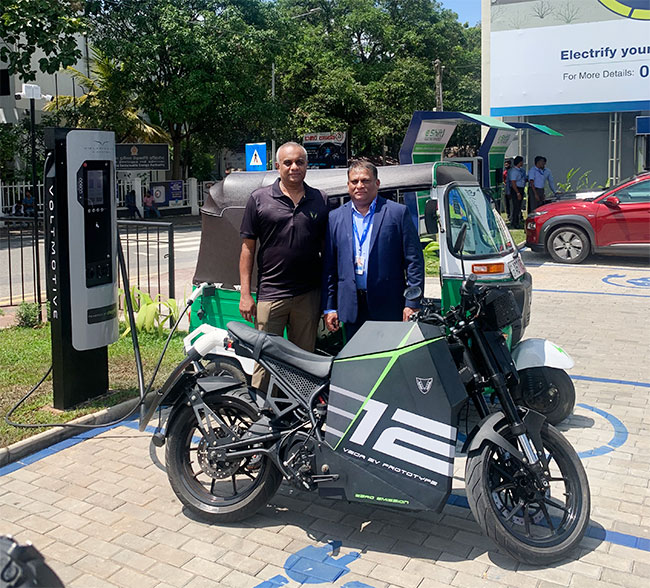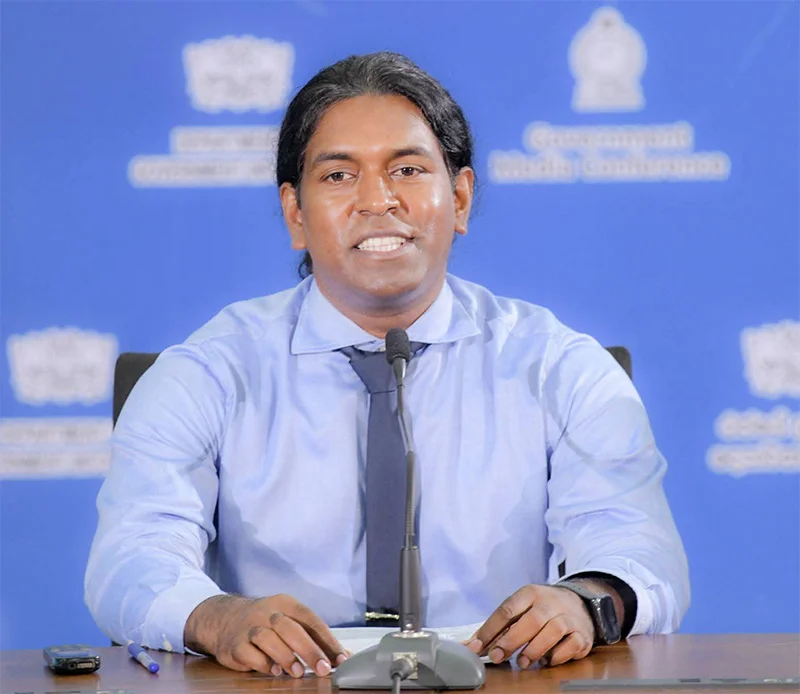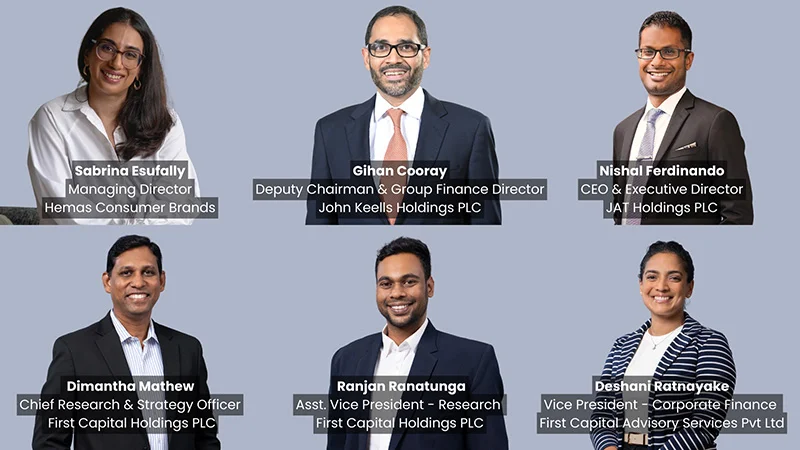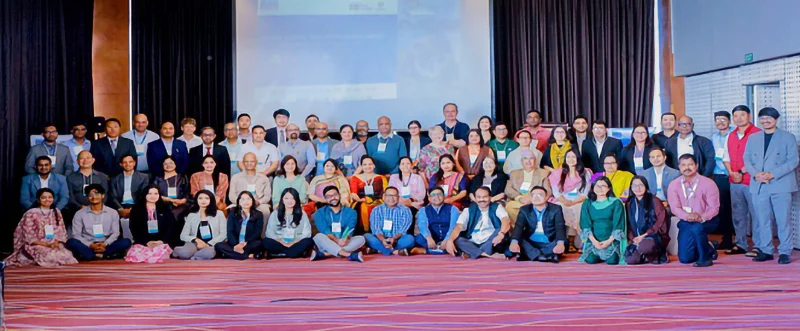Business
Collaboration to accelerate SL along the road to greener, sustainable mobility

By Ifham Nizam
The buzz around carbon markets continues to grow worldwide, however, market growth in Southeast Asia has been relatively mute.
The good news is that Sri Lanka is on the right track, thanks to timely initiatives by Citizens Development Business Finance PLC (CDB) and CodeGen International (Pvt) Ltd. Their ambitious venture aims at bringing in technological solutions for some 5 million vehicles to eradicate carbon foot prints.
CDB yesterday launched the e Shift Concept Center in Colombo 07 as a step to accelerate the Company’s sustainable mobility solutions focused under the Net Zero vertical of CDB’s Sustainability Agenda.
The agreement was signed recently by Managing Director/CEO of CDB Mahesh Nanayakkara and chairman/CEO of CodeGen Dr Harsha Subasinghe.
The collaboration agreement was inked with CodeGen to promote a comprehensive ecosystem for EVs. The Shift Concept Center was launched as landmark initiative in accelerating CDB’s sustainability mobility solutions.
CDB Managing Director /Chief Executive Officer Mahesh Nanayakkara stressed that accelerating sustainable mobility solutions is a key vertical under the Net Zero Pillar within the CDB Sustainability Agenda.
Nanayakkara added: “As a responsible corporate steward we have committed to accelerate sustainable mobility solutions by promoting EVs and EV infrastructure, in addition to knowledge sharing. With over 1 million three wheelers on our roads, carbon emission, oil spillage, noise pollution – all health hazards to drivers, have a massive impact on climate change. The lasting positive impact this initiative can make is unimaginable.”
He also said that the cost of conversion, payable duties, cost of funds and customer conviction to convert vehicles adds to a long list. “But we are confident and committed to travel this path with the help of like-minded people and organizations around the world, joining us to pursue a greener economy. Global warming and climate change is not a global crisis anymore, but a global emergency that needs urgent action.”
Enthusiastic about the partnership between CDB and CodeGen International, Dr Harsha Subasinghe stated, “Together, we’re pioneering a sustainable Sri Lanka powered by EVs, while revolutionizing the three-wheeler industry. Through knowledge sharing on EVs, conversions and charging solutions, we’re electrifying the future, one vehicle at a time. Together, we’re not just innovators; we’re trailblazers in building a greener, more eco-conscious Sri Lanka.”
The Centre is designed to promote Electric Vehicles (EVs) and solar energy solutions here. The e Shift Concept Center is another of the progressive steps taken by this Coalition in which ChargeNET, a subsidiary of CodeGen International, which powers the charging stations at the Center, is a partner. This collaboration accelerates CDB’s sustainability mobility solutions by promoting a comprehensive ecosystem for EVs with a focus on knowledge sharing, EV charging and EV conversion.
“The e Shift Concept Center aims to educate individuals interested in sustainable mobility, while generating interest and stimulating enthusiasm about EVs to the public. While creating an informed awareness about a mindful transformation from fossil fuel-based vehicles to EVs, the Center will be a catalyst in prompting a sustainable shift in Sri Lanka’s transportation sector, which has traditionally been reliant on fossil fuels, said Subasinghe.
He also said that to facilitate this transition, the Center will also offer cutting-edge charging facilities for EVs, enhancing the accessibility and convenience of electric vehicle charging and contributing to the growth of the EV ecosystem in Sri Lanka. With over 1 million three wheelers operating in Sri Lanka – all using fossil fuel – CDB and CodeGen will begin converting three wheelers into EVs.
Powered by solar energy, the Center has two conversion bays and seven charging stations with two of these being fast charging stations solely for three wheelers, marking a first for Sri Lanka. The Center will also have parking facilities for additional EVs.
Business
Rs. 1 million fine proposed on substandard plastic producers

The government’s proposal to raise fines on manufacturers of substandard plastic products to as much as Rs. 1 million is expected to trigger a major compliance shift within Sri Lanka’s plastics industry, correcting long-standing market distortions caused by weak enforcement.
Environment Deputy Minister Anton Jayakody said the move targets producers who continue to bypass approved standards, undercutting compliant manufacturers and exacerbating environmental damage.
Environment Ministry Advisor Dr. Ravindra Kariyawasam said the initiative represents a structural market correction rather than a purely environmental intervention.
“Non-compliant producers have enjoyed an artificial cost advantage for years, distorting pricing and discouraging legitimate investment,” Kariyawasam told The Island Financial Review. “Meaningful penalties are essential to restore fairness and industry discipline.”
He said the widespread circulation of low-grade plastic products has eroded consumer confidence and delayed the sector’s transition towards higher-value and sustainable manufacturing.
Industry analysts note that a Rs. 1 million fine would significantly alter risk calculations for marginal operators, forcing upgrades in machinery, testing and compliance or pushing weaker players out of the market.
Kariyawasam stressed that the policy is intended to support responsible businesses rather than suppress industry growth.
“Manufacturers investing in recycling, biodegradable alternatives and quality assurance should not be penalised by competing with environmentally damaging, low-cost products,” he said.
The Deputy Minister indicated that tighter enforcement will be paired with policy support for sustainable packaging and circular-economy initiatives, aligning the sector with emerging global trade and environmental standards.
From a business perspective, the proposed regulation is likely to impact pricing, supply chains and capital investment decisions, while improving the long-term credibility of Sri Lanka’s plastics industry in both domestic and export markets.
By Ifham Nizam
Business
First Capital to unveil Sri Lanka’s Economic Outlook and Investment Strategies for 2026

First Capital Holdings PLC (the Group), a subsidiary of JXG (Janashakthi Group) and a pioneering force in Sri Lanka’s investment landscape, is set to host the 12th edition of its renowned ‘First Capital Investor Symposium’ on 22 January 2026 at Cinnamon Life Colombo, starting from 5.30 pm onwards.
The 12th Edition will focus on Sri Lanka’s Economic Outlook for 2026, offering attendees a comprehensive analysis of market forecasts, investment strategies and emerging opportunities in the capital markets. The symposium serves as a crucial gathering for investors seeking insights to navigate the evolving economic landscape and make sound, strategic decisions.
As a leading investment institution, First Capital remains committed to promoting informed decision-making through comprehensive research and market analysis. By hosting this annual symposium, the organisation reinforces its role as a trusted partner in Sri Lanka’s capital markets, providing a premier platform for investors, professionals, and industry leaders to exchange knowledge, explore opportunities and build meaningful connections.
A key highlight of this year’s agenda will be First Capital’s presentation on the Economic and Investment Outlook, outlining market conditions and investment strategies for the period ahead. The presentation will be delivered by Ranjan Ranatunga, Assistant Vice President – Research of First Capital Holdings PLC.
Business
Rivers, Rights, Resilience Forum 2026 begins in Colombo

Oxfam in Asia commenced the Rivers, Rights, Resilience Forum (RRRF) 2026, a three-day regional forum bringing together water experts, policymakers, civil society, researchers, and community leaders from across South Asia and beyond to strengthen cooperation on shared river systems and climate resilience.
The Forum is part of the Transboundary Rivers of South Asia (TROSA) programme, supported by the Government of Sweden, which works on the Ganges–Brahmaputra–Meghna (GBM) river basins, while also encouraging cross-basin learning at the regional and global levels. This year’s theme is “Building Resilient Communities and Ecosystems.” The Forum is co-organised by Oxfam in Asia and Dev Pro, Sri Lanka.
The forum opened with a welcome address by John Samuel, Regional Director, Oxfam in Asia, who highlighted the deep connection between rivers, politics, climate change, and sustainability. He underlined how rivers shape both environmental and social outcomes across South Asia and called for stronger collaboration between governments and civil society.
“Today building resilience is important in terms of climate and politics, and when civic space is shrinking, we should all work in solidarity,” he said.
Speaking at the Forum, Chamindry Saparamadu, Executive Director of DevPro shared examples of how communities in Sri Lanka have taken actions to ensure equitable access to water resources through catchment protection initiatives, community-based water societies etc. She further highlighted that learning exchanges would be useful to further strengthen inter-provincial water governance in Sri Lanka.
The Chief Guest, Syeda Rizwana Hasan, Advisor, Ministry of Environment, Forest and Climate Change and Ministry of Water Resources, Bangladesh, in her video message, emphasised the need for regional cooperation among South Asian countries beyond the upstream–downstream identity.
“Climate change will make water scarce, so South Asian countries have to come together to work on the common interest of their communities. Rivers are not just ecology but economics as well for communities. Forums like this help us to share our experience and learn from each other,” she said.
-

 Editorial3 days ago
Editorial3 days agoIllusory rule of law
-

 News4 days ago
News4 days agoUNDP’s assessment confirms widespread economic fallout from Cyclone Ditwah
-

 Business6 days ago
Business6 days agoKoaloo.Fi and Stredge forge strategic partnership to offer businesses sustainable supply chain solutions
-

 Editorial4 days ago
Editorial4 days agoCrime and cops
-

 Features3 days ago
Features3 days agoDaydreams on a winter’s day
-

 Editorial5 days ago
Editorial5 days agoThe Chakka Clash
-

 Features3 days ago
Features3 days agoSurprise move of both the Minister and myself from Agriculture to Education
-

 Features2 days ago
Features2 days agoExtended mind thesis:A Buddhist perspective













